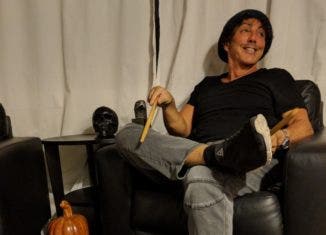Foreign Dispatch: Fighting For The Right To Party In Jerusalem

By FOX News Radio’s Emily Wither in Jerusalem
It’s Friday night and I’m going to a party in Jerusalem, but Friday night in Jerusalem is not Friday night in London. It’s Shabbat, the Jewish day of rest, and the roads are pretty deserted. People are walking the streets with tin-foiled casserole dishes for Friday dinner and lively celebrations are hard to find.
But I find myself in Kiryat HaYovel, a typical neighborhood in southwestern Jerusalem to watch some live music on an empty lot between apartments. But this is no ordinary party. This one is all about deliberately, rather than accidentally, annoying the neighbors.
“We decided we needed to fight the ultra-Orthodox, who want to conquer this neighborhood, in every way that we can and we thought that the best way to win is through doing all kinds of community gatherings,” explained Danny Unger, one of the party organizers, on my arrival.
When you think about conflict in Jerusalem, you often imagine the struggle between the Israelis and Palestinians, but tensions are also rising between secular and ultra-Orthodox Jews, known as Haredi, particularly in this neighborhood…
“I wish that we could live together, but we know for a fact in every other neighborhood the ultra-Orthodox decide they want to live, they bring their whole communities and the secular had to leave,” Unger says.
Unger, an art history teacher by day takes on a different role come evening. He belongs to a group of residents who are working to keep the Haredi Jews from ‘taking over their neighborhood’. They say the community council rejected their request to stage their Shabbat events in a nearby hall so they pitched up in this field instead.
I also meet more extreme residents of the neighborhood, like Noam Pinchasi, he tells me this is a “war”. His urban guerrilla gang sows mischief on the streets by sticking up raunchy posters on synagogue doors.
The ultra-Orthodox are the fastest growing population in Israel and are expanding into secular areas like Kiryat HaYovel. Sociologists say that with their numbers and political clout growing, they are altering the country’s national identity.
“What we see now is that the fertility for the ultra-Orthodox is so high that already numbers of children listed in elementary schools are reaching 50% in Jerusalem,” explained Sociologist Menachem Friedman. “In a few years people are telling me that they will be the majority in Jerusalem and that raises a lot of problems about what will happen to the so-called “secular,” he continued.
Friedman says that the ultra-Orthodox community is very cut off from the rest society and that only adds to the tension. This year there’s been a fierce public debate about the continued exemption of the ultra -Orthodox from Israel’s compulsory military draft.
“They continue not to study secular studies and not to work,” he said.
As the numbers grow, Friedman’s concern is that the government will eventually be unable to support the Haredi way of life. He believes that if the ultra-Orthodox want to study the Torah all day they must do it on their own account.
A negative attitude towards the ultra-Orthodox appears to be taking root in the younger generation as well. A recent questionnaire by a popular Israeli teen magazine revealed that nearly 50% of respondents had a negative attitude towards the Haredim. Only one in seven harbored similar views towards Arabs.

At a coffee house, I meet with Jacob from the Ultra Orthodox community and immediately make the faux- pas of reaching out to shake his hand. He grins and politely explains he cannot take it. Jacob lives in Jerusalem and although he served in the military, he acknowledges that many of his friends didn’t. He believes his community serves the country by learning and studying the Torah. He’s heard about the “war” in Kirayt HaYovel and knows families who have had to leave the neighborhood.
But Jacob believes a solution is possible, “I grew up in a non-religious neighborhood and we learned to respect each other,” he said. “I think with real understanding we can definitely live side by side next to each other.”
Back at the party, as the band’s Greek music echoes through the otherwise quiet, leafy streets, architect Deana Azriel, says her fight is to keep the public spaces open.
“I don’t want to be in a public space and be told how to dress. It’s none of their business,” she said. “I don’t want to be told how to behave, or whether I can drive a car or watch a movie on Shabbat. The same, I will never tell someone not to go to the synagogue, but it has to work both ways.”
Azriel believes these Sabbath parties will inspire others to reclaim their neighborhoods. She feels the rationalization is simple; in a democratic society people should be given the choice to spend their weekend how they wish.
LISTEN to FOX News Radio’s Emily Wither reporting from Jerusalem:











